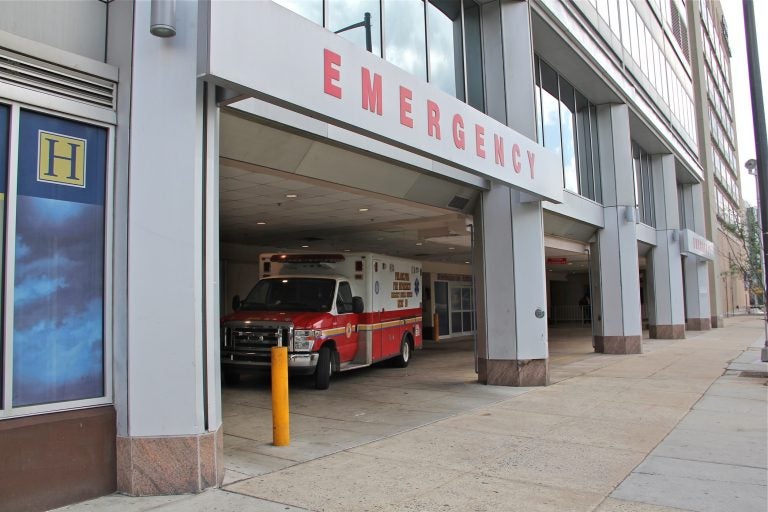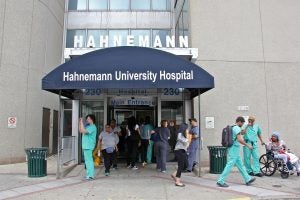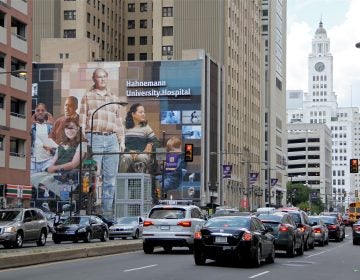Hahnemann wants to stop taking new patients Friday
The proposed closure timeline released Tuesday still needs official approval from the city Health Commissioner’s Office and the state Health Department.

Hahnemann University Hospital. (Emma Lee/WHYY)
Updated: 6:19 p.m.
—
Philadelphia Academic Health System, Hahnemann University Hospital’s parent company, has announced its proposed closure schedule.
U.S. Bankruptcy Judge Kevin Gross is expected to make a decision on the hospital’s closure plan Friday in Wilmington as a part of Hahnemann’s Chapter 11 proceedings. That hearing was originally scheduled for Tuesday morning, but Gross pushed it back last week in hopes that the hospital’s leadership could work with the Pennsylvania Department of Health and the Philadelphia Health Commissioner’s Office — both of which filed objections to aspects of the proposed closure — to come up with a plan everyone agreed on.
Philadelphia Academic Health System’s interim CEO, Ron Dreskin, said those conversations have been taking place.
“We have been working hand in hand with the mayor’s office, Drexel University, and officials from the Philadelphia Health Commissioner’s Office and the Pennsylvania Department of Health to ensure a smooth wind-down of operations,” he said in a statement Tuesday afternoon.
Hahnemann is the primary teaching hospital for Drexel’s College of Medicine.
The closure timeline still needs official approval from the city Health Commissioner’s Office and the state Health Department. The latter installed a temporary manager at Hahnemann earlier this month to ensure a responsible shutdown. The state still has a cease-and-desist order in effect to keep the hospital from closing.
“While the Hahnemann University Hospital closure plan has not been approved, we are aware of the schedule,” state Health Department spokesman Nate Wardle said Tuesday. “Our temporary manager remains on site to ensure that the patients being served receive high-quality care.”
Deana Gamble, a spokeswoman for Mayor Jim Kenney’s office, said that the proposed schedule is consistent with the discussions city officials have been having with Hahnemann to date, but that several outstanding issues still need to be resolved before the closure plan can receive final approval.
The closure schedule, as proposed by Philadelphia Academic Health and pending state and city approval, is as follows:
- Admissions from the emergency department will end at 7 a.m. on July 17.
- Elective surgical cases requiring inpatient care will cease on July 17.
- The inpatient operating room will close for non-emergency cases on July 17.
- Direct inpatient admissions will cease on July 19.
- Endoscopy and colonoscopy services end on July 26.
- Same-day surgeries will end on July 26.
- Infusion center and aphaeresis services end on July 26.
- Sleep Lab will close on July 26.
- Emergency Department will close on Aug. 16.
- Hospital services such as lab, radiology, blood bank, and pharmacy will close on Aug. 23.
- The Drexel outpatient oncology suite located in Hahnemann will cease operations on or before Sept. 6.
- The hospital building is planned to close on or about Sept. 6.
Hahnemann’s emergency department forfeited its Level 1 and 2 trauma center designations shortly after announcement of the hospital’s planned closure. The hospital stopped accepting expectant mothers in its labor and delivery unit last Friday, July 12.
In late June, the owners of the historic, 495-bed teaching hospital at Broad and Vine streets in Center City announced plans to close it. The news was met with outcry from medical staff, patients, doctors in training, and City Council members, who claimed the loss of services would be a public health emergency. Hahnemann’s emergency room typically saw over 40,000 people a year, and many of its patients are uninsured or on public insurance.
Most recently, the proposed closure drew national attention from presidential candidate Bernie Sanders, who accused Joel Freedman, president and CEO of Philadelphia Academic Health’s parent company, of prioritizing profits over patient care by plotting to sell the land under the hospital for its valuable real estate.
The hospital’s real estate is not included in the Chapter 11 filing.
St. Christopher’s Children’s Hospital, which Philadelphia Academic Health System also owns, is included in the bankruptcy filing, but will not close.
In Bankruptcy Court on Friday, Judge Gross is also expected to rule regarding the fate of Hahnemann’s more than 550 medical residents and fellows. The hospital has proposed a plan to sell most of its residency programs to Tower Health for $7.5 million.
WHYY is your source for fact-based, in-depth journalism and information. As a nonprofit organization, we rely on financial support from readers like you. Please give today.






